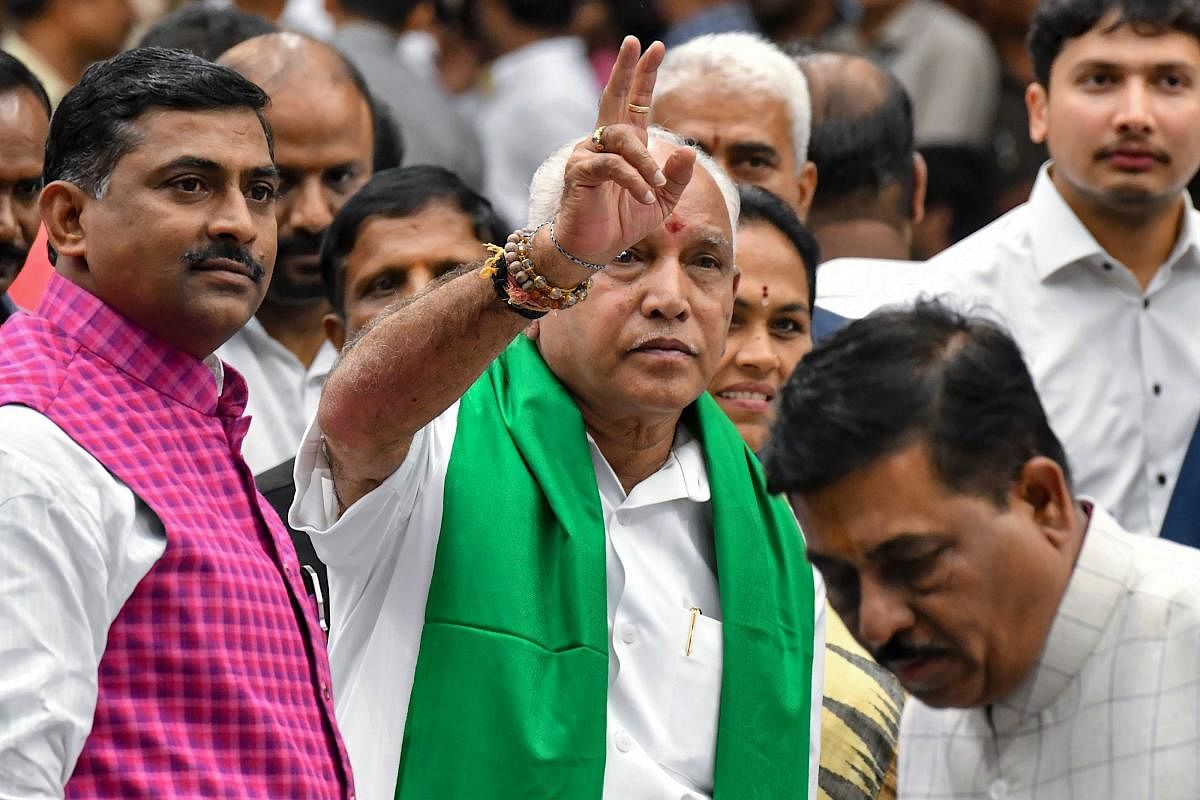
With his second, virtually hurried assumption of office as chief minister of Karnataka in a matter of 14 months, Bookanakere Siddalingappa Yediyurappa has become the holder of two new records in the state.
Among the 23 chief ministers that Karnataka (earlier known as Mysore) has seen since October 1947, Yediyurappa is the first person to enjoy a fourth term which has come over a span of 12 years. Yediyurappa has scored another first by getting a second chance within the term of the 15th Assembly, after losing the trust vote earlier.
Ramakrishna Hegde served three consecutive tenures (1983-84 -- one year, 354 days, 1985-88 – two years, 176 days, 1988-89 – one year, 176 days) after resigning from office twice.
Indicative of the fragility of the office of the chief minister, only S Nijalingappa and D Devaraj Urs have had full five-year tenures, until Siddaramaiah joined their ranks recently after a gap of nearly four decades.
Given the take-no-prisoners approach of Prime Minister Narendra Modi and Bharatiya Janata Party (BJP) chief and Home Minister Amit Shah to running the party, Yediyurappa should consider himself lucky that he remains their ‘chosen one’ in Karnataka, his not-so-glorious track record during his previous terms notwithstanding.
Modi and Shah have applied the principle of keeping those above the age of 75 in the party out of elections and elected offices. The most recent high-profile ‘victim’ of this principle was former Lok Sabha Speaker Sumitra Mahajan, who was denied party ticket from Indore as she had crossed the age of 75 years.
But they seem to have taken a conscious decision to make an exception to this rule as far as Yediyurappa is concerned.
Born on February 23, 1943, Yediyurappa had crossed 75 years when the 15th Assembly results were declared on May 15, 2018. Though the BJP had fallen short of majority by nine seats, Yediyurappa was allowed to take oath as chief minister. He barely lasted three days and resigned after failing to muster the numbers.
Most influential leader
Outside the Hindi belt, particularly the south of Vindhyas, the BJP has failed to find a leader as tall and influential as Yediyurappa in the last two decades or more. For the BJP, Karnataka has delivered in excess of 15 Lok Sabha seats in the last four elections, while the party has barely opened its account in its southern neighbours.
In this success, Yediyurappa, with his combative politics and complete hold over the numerically-strong Lingayat community, has played a significant role.
The BJP also recognises that though ‘the Modi factor’ was largely instrumental in the party routing the Congress- Janata Dal (S) combine in the May 2019 Lok Sabha polls and bagging an unprecedented 25 out of 28 seats, it was Yediyurappa’s leadership at the local level which provided the killer punch.
Yediyurappa’s focus has always been on Karnataka, though apart from winning six terms to the Assembly, he has been elected to the Lok Sabha twice. After losing power in 2018 by the proverbial hair’s breadth, Yediyurappa and his associates kept nibbling at the Congress-JD(S) coalition government, which never settled down due to internal bickering. After the hugely demoralising Lok Sabha defeat – after fighting the elections together – the coalition government fell apart like a pack of cards.
Even after the fall of the Kumaraswamy government, the BJP leadership appeared to be weary of staking claim immediately as the numbers still didn’t add up. Officially, the BJP’s strength in the Assembly has marginally gone up from 104 to 106 in a House with an effective strength of 222 members after the disqualification of three MLAs by the Speaker.
Speaker KR Ramesh Kumar’s decision on the resignation or disqualification of 16 more MLAs (including Srimath Patil and B Nagendra, who abstained from the trust vote citing health reasons) will have a huge bearing on the balance of power in the Assembly.
The BJP leaders from Karnataka appear to have convinced the top leadership in the party that if it did not act quickly, the ‘gains’ of the last three weeks would be frittered away, even if just two or three rebel MLAs changed their minds.
With the help of friendly Governor, Vajubhai Vala, Yediyurappa has been asked to take the “risk” and steer the ship to safety by taking a vote of confidence on Monday. If the deed is done on Monday, the government could be safe at least for some time.
After taking the oath and at his first press conference, Yediyurappa pithily remarked that his job would be to clean up the administration and give a good government in the next three months. Does the reference to “three months” have any significance?
It is quite possible that Modi-Shah duo might consider asking Yediyurappa to go for dissolution of the Assembly by October and opt for fresh elections along with Maharashtra and Haryana. It would help the party to aim for a clear majority on its own rather than hobble around with the help ‘defectors’ who can never be satisfied fully.
(Ramakrishna Upadhya is a senior journalist based out of Bengaluru)
The views expressed above are the author’s own. They do not necessarily reflect the views of DH.